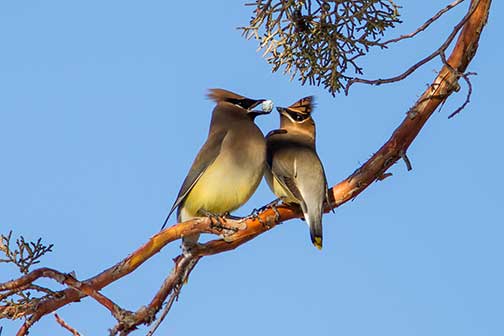 |
Previous Issues |
| Cedar Mill Community Website |
|
Search the Cedar Mill News: |
About The Cedar Mill News |
|
|||||||
| Volume 12, Issue 1 | January 2014 |
||||||
The Nature of Cedar Mill
|
||||
 |
| Cedar Waxwings and Juniper Berry - Sisters, Oregon - December 2013 Photo ©2013 by Jeff Young. |
What we saw was indeed amazing. We saw huge flocks of Mountain Bluebirds, Cedar Waxwings and American Robins feasting on plump juniper berries. Some birders I have taken out on bird tours simply want to check birds off their list and then go accumulate “more numbers” for that day of birding. That certainly is one method of bird watching. Personally, I enjoy seeing what the birds are doing, and so generally stay to watch them. What my husband and I saw that day was quite intriguing.
We watched as adult birds picked a very plump berry and then fed it to another adult. At some times of course they ate the berries themselves but often they “gifted” another bird with a particularly yummy treat. And so I wondered--- what is this behavior, since it is certainly not spring yet and no mating will happen for quite a long time.
From an interpersonal neurobiology point of view, reciprocal gift giving might just encourage bonding over the entire season. Feelings of mutual appreciation, recognition of mutual dependency or even affection might be involved. We don’t know of course, but having positive memories of others might be involved in the giving of gifts.
Over this season I read lots of “advice” columns in magazine or newspapers about what to do when one receives a gift that is not “optimal” however that is defined. The advice generally falls into the pabulum of recognizing the thought behind the gift to reframe the meaning of the gift. I would suggest that certainly that might fit some situations. In other situations, there is not a particular thought behind the gift, and that is a valuable, symbolic, authentic understanding as well that needs to be honored. I wonder if other creatures have such complex social thoughts about the proffered juniper berry that we do about the gifts we receive or give.
Bird watching can lead to innumerable musings about the meanings of behavior and of life. Biologists tend to categorize behaviors in terms of simplistic things like mating or feeding young—but this observed behavior was not in mating season and certainly was not about feeding babies… so what does it mean?
Lauretta Young MD is the current director of the OHSU Student resiliency program and past chief of mental health at Kaiser. She also takes people out to observe birds—see her web site at: portlandbirdwatching.com. More of her husband’s photos can be found here on Flickr.
![]()
Like us on Facebook for timely updates
Published monthly by Pioneer Marketing & Design
Publisher/Editor:Virginia Bruce
info@cedarmillnews.com
PO Box 91061
Portland, Oregon 97291
© 2013